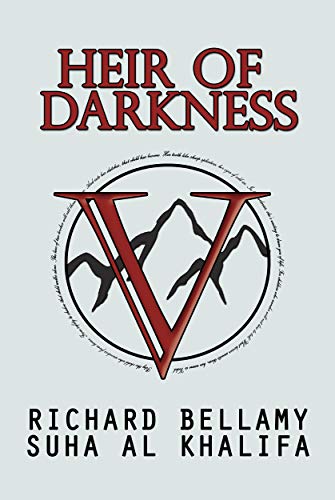
Heir of Darkness received a 4+ star review, making it an IndieReader Approved title.
Following find an interview with authors Suha AL Khalifa and Richard Bellamy.
What is the name of the book and when was it published?
Our book is called Heir of Darkness. The novel was published on 16th of July through indie publishers Black Rose Writing.
What’s the book’s first line?
“Under the shadow of a mountain, a fire burned furiously at the heart of a gypsy camp.”
What’s the book about? Give us the “pitch”.
For us, the heart of the story is tribal. Our tribes come from vastly different backgrounds. Humanity is represented through the noble classes who occupy the city, whereas the gypsies roam on the periphery of society. Ghost also linger, trapped in a purgatory, unable to move on. Then there are the immortal vampires who have remained in the shadows of the mountain, until now. These lost souls search desperately for love, family and acceptance and will go to the extreme lengths of good or evil to reach their ambition.
The story takes place in the end of the 18th century, on a mountain range, in Bohemia. Sophia, a medium receives warning of an approaching danger. From his mountain palace comes Luciano, son of the Vampiress Lord Vedel, intent on finding his queen at the Countess’ ball. Instead, he discovers the captivating Lilianna, a gypsy girl and a rival in the Countess’ son Alexander.
Luciano and his mother, Vedel, are known to the gypsy people. Every gypsy child is taught to fear the vampire threat. When Lilianna returns home to her mother, Nadja, she unleashes a nightmare at her people’s doorstep and sends Vedel’s plans into chaos.
This clash of fates will bring together the living, the dead and the undead into a tempestuous adventure of love, hate, jealousy, and murder. Who will stand to oppose the ambitions of the redoubtable Vedel?
What inspired you to write the book? A particular person? An event?
Suha’s response:
In Bahrain I would hear the most wonderful spiritual stories that have been passed down for generations! Ghost stories are a norm there and I started to daydream what the ghost world would be like if it was mixed with a vampire world.
I started to tell Richard these ideas over the phone and the characters just started to come alive. Once I was able to move and get married, we really sat down and wrote it out, originally as a screenplay.
Richard’s response:
Suha had the notion of ghosts and vampires being at odds – the victims returned to haunt their attackers. We found the story was best told through a medium who is a conduit between the worlds of the living, dead and undead. From there it just fell into place and our story grew into an epic struggle of good and evil, love and betrayal, revenge and acceptance. We were able to weave in my passion for mythology and Suha’s expertise in psychology. We hope we have created characters that readers can invest in and empathize with.
What’s the main reason someone should really read this book?
While our story draws from gothic literature with influences of classics like Wuthering Heights and Salem’s Lot, we tried to subvert expectations of the supernatural and paranormal genres. The central characters, both protagonists and antagonists, include strong female voices in roles that challenge the conventions of the genre. For example, the core threat of the story comes from the vampiress Lord Vedel whose plans for dominion begin with sending her immortal son to find his bride among the ranks of the aristocracy; a stark contrast to the predatory machinations of figures such as Dracula, though no less sinister. These choices allowed us to explore the themes of family, motherhood, and eternal love of a different kind.
What’s the most distinctive thing about the main character? Who-real or fictional-would you say the character reminds you of?
While our story is more of an ensemble than following a single main character, Sophia is the fulcrum at the center of the narrative. Her selfless abilities to speak with the dead set the story in motion as she learns of the coming threat from a spirit. That same gift will come to be her torment when the only voice she cannot hear belongs to the man she loves. And ultimately, her talents will be the prize that could turn the tide of the great Vedel’s plans for domination. Sophia is the personification of our central theme, which is empathy.
If they made your book into a movie, who would you like to see play the main character(s)?
Suha’s response:
I always saw Dakota Fanning in the role of Sophia, a medium with an abundance of empathy. Dakota’s eyes are so very expressive and haunted, as though she was a conduit for voices beyond her years and experiences. For me, it matches perfectly that she would hear and speak for spirits yearning to reconnect.
Richard’s response:
We also pictured Glen Close and Sigourney Weaver taking on the roles of the formidable female characters of Lord Vedel and they gypsy mother Nadja. The characters represent vastly different ideals of motherhood, yet both are prepared to go to the ends of earth, beyond death, for their goals or for their child.
When did you first decide to become an author?
Suha’s response:
Richard and I met in the summer of 2003 at the New York Film Academy in London. He was working as a teacher, while I was taking other classes. We developed a great friendship over our backgrounds and love of storytelling.
I was raised in Bahrain yet spent some time in London and Washington DC as my father was the ambassador. Pursuing a career in film and writing was frowned upon where I come from, but my efforts have managed to change the minds of many in my country. I have been able to establish myself as pioneer and somewhat of a rebel for never giving up on my dreams.
Richard’s response:
I grew up in the UK at first struggling with reading and writing as I had dyslexia. However, a good English teacher had some faith in me, and I found my storytelling voice. From there I became obsessed with mythology and movies and started writing my own stories.
Our paths seem intertwined by our love of stories and despite the distance between the UK and Bahrain, we quickly fell in love. We spent 6 years apart, but never stopped working on our writing.
We just celebrated our 11year wedding anniversary. We now live in London with our three kids.
Is this the first book you’ve written?
Suha’s response:
We wrote a supernatural drama depicting a culturally authentic portrayal of Jinn in the modern world entitled Existence: The Butterfly Dream. I self-published in Bahrain, where it was a best seller. This story was in fact how I came to start working with Richard as I asked him to look at an early draft of a screenplay I had written when I met him at film school. We have collaborated ever since.
We also wrote a children’s story offering an escapists adventure to deal with childhood bereavement. As a psychotherapist who has specialized in bereavement, I saw storytelling as a means to guide a child through the tragedy of losing someone close to them. In the case of the story, this was a best friend to a child of just 8.
What do you do for work when you’re not writing?
We are fortunate to say that writing has now become our full-time jobs. It has taken many years of persistence and building a network, but we were fortunate enough to find people who saw what we were capable of. For us it was three people – our agent Stephanie Hansen of Metamorphosis Literary Agency – Mick Southworth an independent film guru who asked us to write a sci-f- script – and Peter Smith, our boss at MBC Studios (Middle Eastern Broadcasting Center) who took a chance on us to fix an episode of a TV drama for him. We went on to write the entire season and much more since, including the Middle East’s first female superhero movie.
How much time do you generally spend on your writing?
Richard’s response:
We are parents to three children – Farris, Latifa and Leia. Both Farris and Leia are on the autism spectrum, so we have become carers and advocates for them. Being writers has meant we can work from home, allowing us to be present for them as they grow up – giving them all the care and attention they need. What time they allow us, we put into our writing. Now there they are getting older and the youngest is starting school, writing is our day job and more. We have been able to keep very productive and we are doing what we love.
Suha’s response:
As a couple we have a little writers’ room feel to our work and are able to bounce ideas and feedback off one another. It seems to work for us. So far, we have been able to deliver, exceeding expectations for the television network we currently write for.
What’s a great piece of advice that you can share with fellow indie authors?
Suha’s response:
Being persistent and constantly working on your craft. Exposure is very important, so make sure to deal with the right people and platforms. Finding an agent took a long time. So long in fact we were able to develop a prequel and sequel that we hope to write if Heir of Darkness is a success. Signing with Stephanie Hansen of Metamorphosis Literary Agency was a huge blessing for us. Otherwise, show your vision – the story is as important as the message behind it.
Richard’s response:
I agree, persist with the writing. Hone your craft – take classes, make mistakes, and learn from what is not working. To make that step of getting your book out there requires the dreaded networking. People need to see what you are capable of. It may not be the book you are trying to pitch that gets you the break when that right person recognizes your talent.
Which writer, living or dead, do you most admire?
Suha’s response:
Steven King’s Salem’s Lot captured my imagination as a child. It drew me to the supernatural, and it is a genre I love to surround myself in, both as a writer and as a reader or viewer. There is so much scope for exploration in the fantasy realms and I love to fuse the imagined and real worlds. I could even route Salem’s Lot for my studies in psychotherapy, where I wished to understand and explore the human interactions that drive us all. For me, both fiction and therapy can have a significant hand in offering insight and guiding people.
Richard’s response:
The most influential book I have read is Joseph Campbell’s Hero with a Thousand Faces. I am drawn to the power of mythology as a tool for shaping society, morality and finding one’s own place in the world. Stories can and should be part of our rite of passage. Campbell’s work solidified many of those ideas for me and allowed me to see the universality of both myth and storytelling. Stories prove we are all the same at our core.
The fiction writer that most resonates with me is Philip Pullman and His Dark Materials trilogy. It is a masterful use of these same mythological notions and draws you into a wonderfully realized world.
